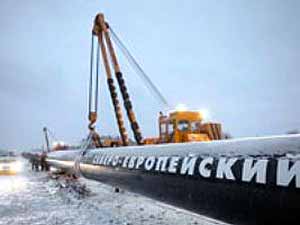November 09, 2007 (the date of publication in Russian)
Sergey Pravosudov
"NORTH STREAM" PROCEEDS TO THE WEST
Dutch Involvement Relieves Germany of Reproaches for "Splitting Europe"
 On November 6, the project of the trans-Baltic underwater pipeline, known as North Stream, was joined by N.V. Nederlandse Gasunie. The Dutch company is going to acquire a 9% stake in the management company, Nord Stream AG. Russia's Gazprom holds a 51% stake in the project while Germany's E.ON Ruhrgas and Wintershall, which have held 24.5% each, are supposed to yield a 4.5% stake each to Gasunie.
On November 6, the project of the trans-Baltic underwater pipeline, known as North Stream, was joined by N.V. Nederlandse Gasunie. The Dutch company is going to acquire a 9% stake in the management company, Nord Stream AG. Russia's Gazprom holds a 51% stake in the project while Germany's E.ON Ruhrgas and Wintershall, which have held 24.5% each, are supposed to yield a 4.5% stake each to Gasunie.
The agreement of Gazprom and Gasunie, signed in Moscow during the official visit of Jan Peter Balkenende, Prime Minister of The Netherlands, enables the Russian corporation to acquire a 9% share in the BBL pipeline, which connects Holland with England.
The accession of the Dutch company is a significant contribution to the project's perspectives. The Netherlands has been extracting and exporting gas for decades, particularly to Germany. However, its resources of "blue fuel" are exhausted. For that reason, Amsterdam is increasing purchases of gas from Russia, which reached an amount of 4,7bln cub m in 2006.
Cooperation with Gasunie expands Gazprom's opportunities at the British market as well. Gazprom already owns a stake in the Interconnector pipeline, linking Belgium with UK. In 2006, Britain purchased circa 9 billion cub m of gas from Gazprom.
The gas resources of Great Britain's North Sea shelf are also exhausted. According to the estimates of the UK Ministry of Energy, by 2020 Britain will import 80% of the gas it consumes.
Czech Republic is one more nation which recently expressed its interest in purchase of gas via North Stream. The strongest opponent of the project is Poland, which would prefer the pipeline to be pulled across its territory and not under the sea. In an effort to resolve the controversy, BASF proposed to connect Poland with a branch of the trans-German Opal pipeline. Unification of the pipeline systems of Germany and Poland would enable Warsaw to purchase gas not only from Russia but also from Norway.
Thus, the number of North Stream's partner states is increasing, and this provides additional guarantees of the project's implementation. Construction was delayed due to a non-constructive approach of Baltic States, especially Estonia – but only for two months, which is not a dramatic tarriance. The Baltic States had already undergone criticism from the representatives of nations which have already signed contracts for gas imports, namely Germany, France and Denmark.
Gasunie's involvement in North Stream has significant political implications as well. The commitment of the Netherlands to join the project puts an end to the argument that the project's implementation allegedly contradicts to EU's energy interests. Since the Russian-Dutch agreement is signed, media attacks on North Stream, interpreted until now as a "separate deal" of Russia and Germany, will not any longer sound convincing. This is particularly important for German corporations, as well as for the official Berlin, which has withstood massive political pressure from Washington and the Euroatlanticist political circles.
Sergey Pravosudov is the Director of National Energy Institute, Moscow
Number of shows: 1865
 ENG
ENG 

 ENG
ENG 
